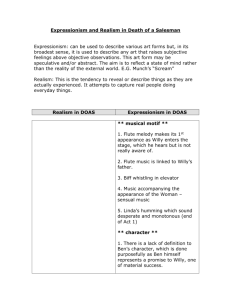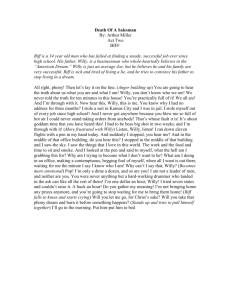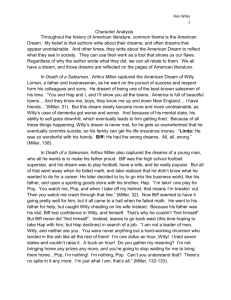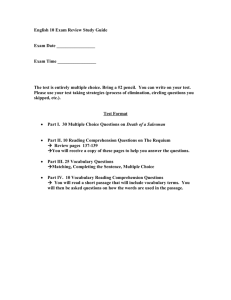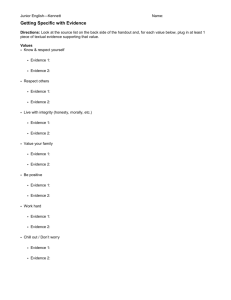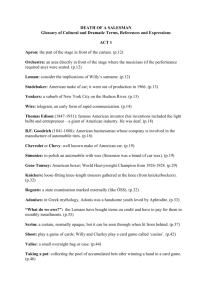Extended Critique & Staging Rationale Chosen Play: Death of a
advertisement
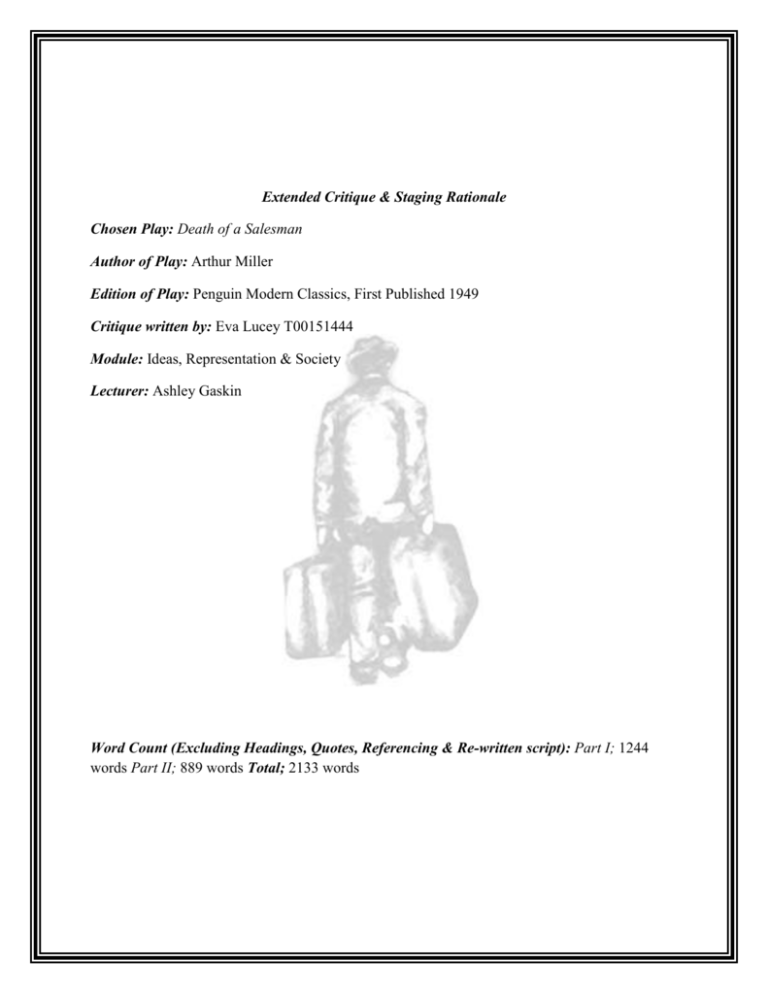
Extended Critique & Staging Rationale Chosen Play: Death of a Salesman Author of Play: Arthur Miller Edition of Play: Penguin Modern Classics, First Published 1949 Critique written by: Eva Lucey T00151444 Module: Ideas, Representation & Society Lecturer: Ashley Gaskin Word Count (Excluding Headings, Quotes, Referencing & Re-written script): Part I; 1244 words Part II; 889 words Total; 2133 words Part I; Extended Critique Introduction: I decided to base by extended critique on Arthur Miller’s, Death of a Salesman. The main reason I chose to study this play more intensely was due to the fact that I found it interesting to read and because I liked the range of themes and topics that Miller addresses throughout the two acts. Summary of the Play: Plot Death of a Salesman is based on the life of Willy Loman, an elderly salesman, his wife Linda and two sons Biff and Happy. Willy is a confused and erratic character, who seems to be tired and weary of life. He is a man who is burdened with years of regret and as a result it has made him bitter and hostile. He had dreams in life that he never pursued and now we see him trying to fulfil his dreams and live through his two sons, Biff and Happy. Willy’s life is ruled by guilt and this guilt has completely overpowered his ability to love. In the play we see that Willy has a very damaged and complicated relationship with his eldest son Biff. Willy’s yearning for his son Biff to succeed in life is somehow a dysfunctional and strange display of his affection and care. Willy and Biff’s relationship deteriorates even further when Biff discovers that his father is having an affair with another woman. Even though they attempt a reconciliation, Willy and Biff continue to argue and unfortunately do not resolve their differences. Tragically, Willy decides to kill himself at the end of the play, in a car accident. Regrets seem to play a large part in this play. Miller’s belief was that “Maybe all one can do is hope to end up with the right regrets”. 1 Characters 1 Willy Loman: The Central character. An unconfident and elderly Salesman. Has become quite erratic and confused with his years. The American Dream seems to be a large factor in Willy’s life and beliefs. He strives for a life of wealth, respect, prosperity and success. He is missing out on the more important things in life, such as, living and enjoying life itself, family, friends and love. Linda Loman: Loyal, Respectful, Loving and affectionate to her husband Willy. Always concerned for her husbands and sons’ well-being. She loves Willy and stands by him through thick and thin. Biff Loman: Willy and Linda’s eldest son. Biff would like to live a simple life and it is clear that material wealth means very little to him. Acknowledges his failures in http://www.notable-quotes.com/m/miller_arthur.html Notable Quotes life and is not afraid to follow his dreams. Biff believes he cannot start to live his life the way he wants to as long as Willy is around. Happy Loman: As the younger son, he has lived in Biff’s shadow for many years. Has an ambition to succeed in a professional career. He possesses all the traits his father admires in a man. Charley: Willy and Linda’s neighbour who owns a successful business. Willy is envious of Charley’s life and success. Bernard: Bernard is Charley’s son and is also a prosperous lawyer. Great friends with Biff and Happy. Admires Biff greatly. The woman: The woman that Willy begins an affair with. She admires Willy, shows him affection and as a result boosts his ego and self-esteem. Uncle Ben: Willy’s older brother. Found diamond mines in Africa and was a wealthy man at a young age. Died before the time in which the play is set put appears in Willy’s illusions. Howard Wagner: Son of Frank Wagner, Willy’s previous boss. Howard sacks Willy for his crazy behaviour. Jenny: Charley’s secretary Stanley: Waiter at the restaurant where Willy meets Biff and Happy. Helps Willy home. Miss Forsythe & Lette: Two women that Biff and Happy meet. Themes American Dream: Money, prosperity, wealth and success are continuing topics throughout the play. Regret: We see the character being a symbol of regret in the entire play. Infidelity: Willy has an affair with another woman. Loyalty: Linda stands by her husband Willy through everything and supports him. Settings Willy Loman’s house and yard Different places he visits in New York and Boston Copy of the play I studied: Arthur Miller, Death of a Salesman, Penguin Modern Classics, First Published 1949, ISBN 978-0-141-18274-2 Review of Death of a Salesman: Arthur Miller’s Background Personally, I believe that a lot of Miller’s work may have come from his personal experiences and background. We see some mirror images between Miller himself and his life with the story of Death of a Salesman. Miller’s father was a manufacturer of clothes which may be where Miller got his inspiration in allowing Willy Loman to be a salesman. The play is set in Brooklyn which is where the Miller family lived. Miller himself married his first wife and had two children, previous to writing Death of a Salesman, which is similar to the family structure of the Lomans. The American Dream was a large aspect to the play and the character of Willy Loman. I think this had a large impact on Miller and his work due to the fact that he grew up in the 1930’s and 1940’s when the American Dream was most prominent. With Death of a Salesman in 1949, Miller improved his style and ability as a writer and critics praised him. He became one of the greatest twentieth‐century American dramatists. Death of a Salesman won a Pulitzer Prize. Inspiration for Death of a Salesman Arthur Miller began writing Death of a Salesman aged seventeen while working for his father. After finishing the play, he wrote an epilogue on the script saying that the man on whom the story is based had thrown himself under a subway train. Years later, Miller's mother found the script in a drawer. In Timebends, Miller’s autobiography, he wrote of how he found inspiration for Death of a Salesman in his own life. Miller based Willy Loman mainly on his own uncle. The Loman family was created largely on Miller’s uncle and his family. 2 Personally, I think that Arthur Miller gathered his evidence and researched his topic by watching those around him and studying their characteristics and behaviour. 2 http://www.tobysimkin.com/Library/show_DOAS/student-inspiration.htm Student Guide, Written and Designed by David Biele, Arts in Education Consultant, Miller's Inspirations for Salesman. Personal opinions on Arthur Miller’s work in Death of a Salesman Personally, I really enjoyed reading Miller’s work. Even though, Death of a Salesman was written in 1949, it is still easily read and understood today. Having read many plays this summer from various authors; Miller was the one who stood out to me most. I am hoping that once I have completed my extended critique on Miller’s Death of a Salesman as well as my recorded scene from the play, I will have a better understanding of Miller and his work. In my opinion, he is an extremely accessible author. Miller is well known for writing about the notion of ‘self’ in his works and this is particularly seen in Death of a Salesman, with the character of Willy Loman. This aspect of his writing, allows me to relate to Miller’s work. The notion of ‘self’ is connected to each and every human being. There are times in our lives where we think about where we are at in life, our hopes for the future and even contemplate our regrets. I doubt that there is one person in the world who does not have regrets. In my view everyone makes mistakes and has some regrets; whether it is about things that we should have said or done. I know I think about how I have done things and wonder if I had done things differently, would my circumstances and the way I live my life be very different. To me, if you did not have regrets of some sort, it would be unnatural. This is the main reason why I think Miller’s Death of a Salesman will be as relevant in years to come as it is now. Part II; Staging Rationale Chosen Scene: The scene I chose to do my radio recorded enactment on is in Act II. The scene that I wish to focus on is the part in which we see that Willy is having an affair and Biff discovers it. My reasoning for choosing this particular scene is because I think that it is the most important in the play. It shows Willy at the lowest time in his life, how he betrays his family, what he has become as a person and how it destroys his relationship with his eldest son forever. To me, it is the saddest part of this play. Not only does it allow Willy to see what he has done but it is pure heartbreak for Biff to find him with this other woman. I really pitied Biff when I read this scene. This scene is the one which stood out most to me when I finished reading Death of a Salesman. Main Idea for my scene: The scene I have chosen, I have studied in detail. The main part of the scene that I want to focus on runs from page 90 to page 95 in my book. Certain lines in this section I thought suited the way I wanted to write my script. So I took various sentences from the characters and changed them to how I wanted my script to go. The main difference between my script and the original Death of a Salesman is the fact that I changed gender roles. Willy is now played by a woman; the woman whom Willy has an affair with is now a man and the character of Biff, I have swapped for a girl. My main reasoning for this came from reading Caryl Churchill’s Cloud 9. I found Churchill swapping the gender roles in her play, fascinating. It was a really simple but effective way of delivering her work and differentiating her style of writing from others. This aspect of her work really stood out to me. Recording My Scene: Ideas I brainstormed on the ways in which I could present my script, mainly by video recording it or recording it for radio. In the end, I decided to record my piece for radio Radio As I am recording the script for radio, I will have to take many factors into account. Equipment Required: H2 Recorder, Pop Shield, Batteries, Headphones, Audacity Editing Software. Voice Actors: I will need three people to voice my script; two female voices and one male. I will do one female voice myself so all I need to do, is find two more people. Sound Effects: I will need a range of sound effects for throughout my scene, such as; someone knocking at a door and a door slamming shut. I may use sound effects for these or just record these on the H2 Recorder. Opening & Closing Music: I will use intro and outro music just to have a clear beginning and ending to my script. Video If I was to record my scene on camera, these would be the factors taken into account. Ideas & People for Production One male & Two females Setting: Hotel or Bedroom Lighting: Various Lighting Techniques Filmed on a camcorder Lighting Spot Light Chandelier Low Strip Lights Lamps Camera Angles Low angle shots High angle shots Eye level shots Sideways angle Plans for my Scene Recording The first thing that had to be done was to secure voice actors for my scene. I offered the part to two of my friends and they kindly accepted. I am using my own voice for one of the characters in the script. The entire scene will be recorded on a H2 Recorder. I hope to book out one of the quiet rooms within the college library in order to have as little disturbance as possible with the recordings. I will do many recordings of the scene and then I will transfer my recordings from the H2 onto my external hard drive. I plan on then editing my recordings with Audacity editing software. Music & Sound in my Scene My plan is to have Introductory and concluding music for my scene. I decided on this in order to have a defined beginning and ending to it as well as adding a dramatic atmosphere. The music that I have decided to use is a piece called ‘Cut’ by a female artist named Plumb. I am planning on only using the instrumental pieces of the song and I think it will fit very well with my scene. I will also add sound effects to my recording with the hope that it will be dramatic and realistic. Editing my Script As the scene I chose from Death of a Salesman was the one that stood out to me most, I immediately knew the way I wanted to re-script it. After reading Cloud 9, Churchill’s style influenced how I wanted to put a twist on the scene. I chose what I thought were the most important lines and re-wrote them to the way I would say them. I also changed the character’s genders. Once I did a few edits of this, I finally ended up with the scene I wanted. I am really happy with the way my script turned out and I hope once I have finished recording and editing it, that it will be a success. My Revised Script *Willy is now a woman – Willow; The Woman is now a man – The Man; Biff is now a woman – Biff (name being kept) Introductory Music….. SFX: Knocking at door Willow: Sssssh…..Stop laughing…..be quiet! Listen… The Man: Just answer the door. With that knocking, they’ll wake the building Willow: Who could it be? I’m not expecting anyone The Man: Ignore them then & have another drink….You need to relax you know Willow: I could hurt so many people with this affair but I’m just so lonely The Man: Why are you so sad? You know there’s no need to be lonely, you’ve got me Willow: Frustrated….Why won’t they stop knocking?! The Man: Answer it…..It’s starting to get on my nerves! Willow: Fine….Go into the bathroom & stay there until the coast is clear. I’m not supposed to have company The Man: Ok…ok Willow: I’m coming…. SFX: Knocks on door, Opens door, Daughter Biff is there Biff: Why didn’t you answer the door? Willow: Surprised Oh! What are you doing here? Biff: Why didn’t you answer? I’ve been knocking for ages & why’s your phone off? I tried calling Willow: I just heard you, I was sleeping. What’s wrong? Is everything ok? Biff: It’s grand yeah…It’s just…. The Man coughs Biff: Suspiciously Is there someone in there? Willow: No…no…It’s next door, they’re so noisy! Nervous laugh Biff: Somebody is in your bathroom! Willow: It’s next door honey; they’re having some kind of a party The Man: Darling, I……oh Willow: Ammm….ok, thanks a million. This is Mr Jones, he was fixing my shower Biff: Sarcastic & Bitter Mr Jones, who calls you darling, was fixing the shower in your bathroom….right…I thought there was no one in there?! The Man: Look, I’m just going to go….I’ll see ya Willow: Right….thanks again Silence Biff: Starts to cry …..Mum? Willow: Oh honey… Biff: Mum….why? Willow: Love, come here Biff: No! Don’t come near me…Don’t touch me, you liar! What about us? What about Dad?... Willow: He’s nothing to me love, he means nothing. I was just so lonely, so lonely Biff: Angrily I will never forgive you for this….never! Willow: Love, wait….Don’t go… SFX: Door Slams Concluding Music…… Overall, I hope to successfully plan, script and edit this scene and in the end make a well put together piece suitable for radio broadcast. References http://www.notable-quotes.com/m/miller_arthur.html Notable Quotes http://www.tobysimkin.com/Library/show_DOAS/student-inspiration.html Student Guide, Written and Designed by David Biele, Arts in Education Consultant, Miller's Inspirations for Salesman Extended Critique & Staging Rationale Eva Lucey T00151444

